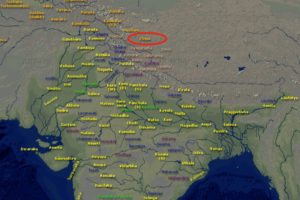The origin of the word – China
21st century China may be very proud of its position as a superpower in the world stage, but the fact of the matter is that most of its history, culture, religion, etc have been derived from Bhārata. In this message, I wish to focus, just on the origin of the word “China”.
The most ancient reference to the word “China”, do you know where it is from? Well, you guessed it right – It is from Bhārata. The Mahābhārata and Manusmṛti mention the Sanskrit word Cīna (चीन). It was used to refer to a country located in the Tibeto-Burman borderlands east of India (Bhārata).
The Mahabharata speaks of the Cīna dynasty, who took the side of the Kauravas (MB III.174.12) during the Mahabharata war (now you know the source of their anti-India stance ;)). A lot of information is available about the Cīnas in ancient Sanskrit literature. The Mahabharata says – The eastern tribes were experts in fighting on elephant back. The Magadha (modern Bihar) army was renowned for elephant warfare (MB V.164.24) and their king, Jarasandha, fought on elephant back (MB VII.91-26). Yet the most gifted fighters on elephant back were the tribes of Pragjyotisha (modern Assam), who trained their elephants to fight an offensive (not just defensive) war, as seen in the narrative about the elephant of king Bhagadatta (MB VII.25.26f) who led an army of Kiratas and Chinas. There you go, Indians, specifically the Assamese were leading the Chinas during the Mahabharata.

In the Bhaktivedanta purports, Srila Prabhupada says in SB 2.14.18 – Khasa: The inhabitants of the Khasadeśa are mentioned in the Mahābhārata (Droṇa-parva). Those who have a stunted growth of hair on the upper lip are generally called Khasas. As such, the Khasa are the Mongolians, the Chinese, and others who are so designated.
Although India holds the roots of Chinese culture and identity, we don’t claim nor study China as we should be. Sinology is located in its home-base China. Whereas Indology is not based in India, it is based in the US. Of course, this is frustrating. I hope the Indian government takes strong, affirmative steps, to train Indic scholars, and set India as the rightful home-base for Indology, and not allow the colonial Abrahamic nexus to study and promulgate Indology with their tainted vision.
You state “but the fact of the matter is that most of its history, culture, religion, etc have been derived from Bhārata. ” Could you substantiate this, with a few examples otherwise it come across as sort of cultural chauvinism.
“India” is what outsiders call Bharata, “Japan” is what outsiders call Nippon and “China” is what outsiders call Zhōngguó.
More on the etymology of the name “China.” https://en.wikipedia.org/wiki/Names_of_China
As for the Sanskrit name Cīna (चीन) that could be a reference to the Western state of Qin (pronounced Chin) that unified “China” under the Qin dynasty. The Qin state being most western part of “China” so it could be argued that it was also closest to India via overland trade routes and thus gave it’s name to the whole of what is now known as “China” to the people of Bharata.
You wrote “(now you know the source of their anti-India stance ;))”
Factually for millennia India and China have had peaceful relations with only one known incursion in ancient times by the Chinese into India as a retaliatory strike after provocation by (I believe) a Gupta monarch. And the recent war in 1962 is generally agreed (in India) to have been caused by Nehru’s own foolishness.